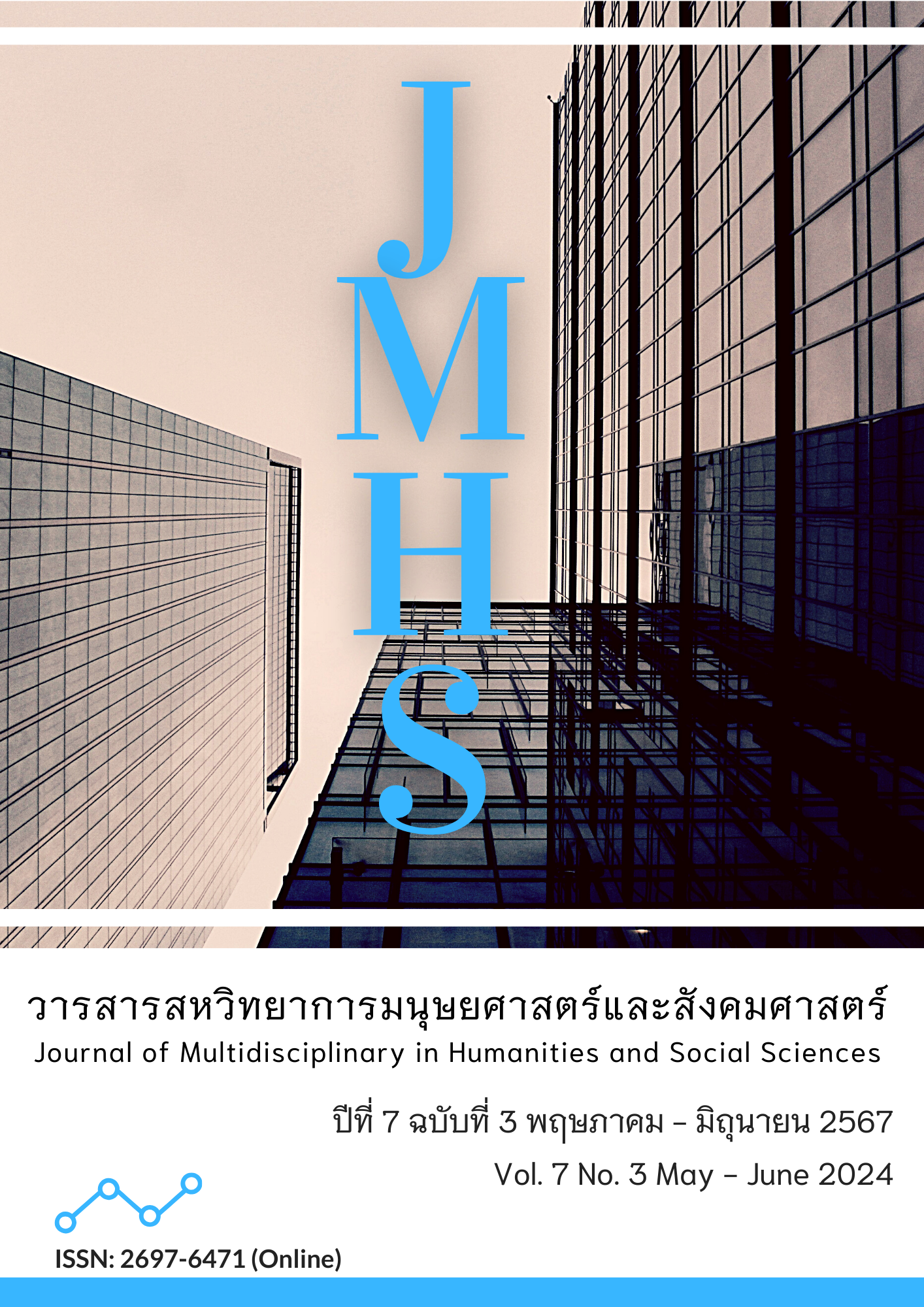The Development of Modern Political Management with the Power of Houses Temples and Schools in the Digital Age
Main Article Content
Abstract
Research on the development of modern political management with the power of houses, temples, and schools in the digital age. It was qualitative research. Field research model the objectives were as Follows: 1) to study the development of modern political management with the power of houses, temples, schools in the digital age; 2) to develop modern political management with the power of houses, temples, schools in the digital age; and 3) to apply modern political management with the power of homes, temples, schools in the digital age. There were 5 groups of people or key informants used in research using in-depth interviews and focus group discussions: group 1: buddhist scholars or abbots; group 2: political science scholars; group 3: mass media; group 4: academics in education or administrators; and group 5: local leaders or heads of families. Total number was 30 photos/person. Data analysis were descriptive content analysis.
The research results were found as follows: 1. From studying, you gain important knowledge. Modern political management with the power of houses, temples, and schools in the digital age is as follows: (1) gain knowledge about management development; (2) gain knowledge about modern politics; (3) gain knowledge about the power of houses, temples, and schools; and (4) gain knowledge about the digital and digital era.
2. The development of modern political management with the power of houses, temples, and schools in the digital age provides information for creating patterns. modern political management with the power of homes, temples, and schools in the digital age as follows: (1) problem conditions; (2) political needs; (3) modern politics through digital media; (4) modern media in the digital age; (5) political principles in the regime democracy; and (6) development of modern political management.
3. “Home” is responsible for personnel, budget, and supervision. “Wat” is responsible for planning and coordination. “School” is responsible for organization, administration, and reporting results.
Article Details

This work is licensed under a Creative Commons Attribution-NonCommercial-NoDerivatives 4.0 International License.
Views and opinions appearing in the Journal it is the responsibility of the author of the article, and does not constitute the view and responsibility of the editorial team.
References
จีระพงษ์ โพพันธ์. (2562). ผลกระทบจากการเปลี่ยนแปลงของเทคโนโลยี. สืบค้นเมื่อ 10 มีนาคม 2562, จาก https://kru-it.com/design-and-technology-m2/impact-of-technology-changes/
ทินพันธุ์ นาคะตะ. (2525). รัฐศาสตร์: ทฤษฎี แนวความคิดปัญหาสำคัญ และแนวทางศึกษาวิเคราะห์การเมือง. กรุงเทพฯ: สมาคมสังศาสตร์แห่งประเทศไทยและบรรณกิจ.
นิยม เวชกามา. (2561). รูปแบบการมีส่วนร่วมทางการเมืองในระบอบประชาธิปไตย ของประชาชนชาวสกลนคร ตามแนวพุทธจิตวิทยา(หลักสูตรปริญญาพุทธศาสตรดุษฎีบัณฑิต). มหาวิทยาลัยมหาจุฬาลงกรณราชวิทยาลัย.
นุชา สระสม. (2560). การมีส่วนร่วมใน "การบริหารแบบบ้าน วัด โรงเรียน" ของโรงเรียนวัด สังกัดกรุงเทพมหานคร(หลักสูตรปรัชญาดุษฎีบัณฑิต) มหาวิทยาลัยศิลปากร.
ประเภทของสื่อ. (2561). สืบค้นเมื่อ 10 มีนาคม 2562, จาก www.medialiteracy-th.com
เปรม ถาวรประภาสวัสดิ์. (2563). ปัจจัยที่ส่งผลต่อการเปลี่ยนผ่านไปสู่ประชาธิปไตย: ศึกษากรณีประเทศอังกฤษกับประเทศไทย(วิทยานิพนธ์สาขาวิชาการเมืองการปกครอง). มหาวิทยาลัยธรรมศาสตร์.
พระครูสมุห์มานิตย์ ญาณธโร (สีทะ). (2560). การประยุกต์หลักพุทธธรรมในการใช้สื่อสังคมออนไลน์สำหรับพระนิสิต มหาวิทยาลัยมหาจุฬาลงกรณราชวิทยาลัย วิทยาเขตเชียงใหม่(หลักสูตรปริญญาพุทธศาสตรดุษฎีบัณฑิต). มหาวิทยาลัยมหาจุฬาลงกรณราชวิทยาลัย.
พระสมุห์วศิน วิสุทฺโธ (พงษ์ศักดิ์). (2561). การจัดการงานสาธารณสงเคราะห์ของพระสังฆาธิการ อำเภอเมือง จังหวัดราชบุรี (วิทยานิพนธ์). มหาวิทยาลัยมหาจุฬาลงกรณราชวิทยาลัย.
ภูวณัฐสร์ หนูมาก. (2549). กระบวนการการมีส่วนร่วมของบ้าน วัด โรงเรียน (บวร) ต่อการพัฒนาโรงเรียนวิถีพุทธ(วิทยานิพนธ์สังคมสงเคราะห์ศาสตรมหาบัณฑิต). มหาวิทยาลัยธรรมศาสตร์.
ราชบัณฑิตยสถาน. (2525). พจนานุกรมฉบับราชบัณฑิตยสถาน พ.ศ. 2525. กรุงเทพฯ: อักษรเจริญทัศน์.
ราชบัณฑิตยสถาน. (2539). พจนานุกรมฉบับราชบัณฑิตยสถาน พ.ศ. 2539. (พิมพ์ครั้งที่ 6). กรุงเทพฯ: อักษรเจริญทัศน์.
ราชบัณฑิตยสถาน. (2554). พจนานุกรมฉบับราชบัณฑิตยสถาน พ.ศ. 2545. (พิมพ์ครั้งที่ 2). กรุงเทพฯ: ศิริวัฒนาอินเตอร์พริ้นท์.
วิชัย ตันศิริ. (2560). การพัฒนาการเมืองที่ยั่งยืน. กรุงเทพฯ: สถาบันนโยบายศึกษา ภายใต้มูลนิธิส่งเสริมนโยบายศึกษา.
สำนักงานคณะกรรมการพัฒนาการเศรษฐกิจและสังคมแห่งชาติ. (2556). สัจธรรมแห่งแนวพระราชดำริ สู่การพัฒนาอย่างยั่งยืน. กรุงเทพฯ: อัมรินทร์พริ้นติ้ง แอนด์พับลิชชิ่ง.
สุรพล สุยะพรหม และคณะ. (2555). พื้นฐานทางการจัดการ. กรุงเทพฯ: มหาจุฬาลงกรณราชวิทยาลัย.
องค์ประกอบของสื่อดิจิทัลเบื้องต้น. (2561). สืบค้นเมื่อ 10 มีนาคม 2562, จาก https://sites.google.com/site/
อริญญา เถลิงศรี. (2563). ศูนย์พัฒนา. สืบค้นเมื่อ 10 มีนาคม 2562, จาก https://www.bangkokbiz-news.com/news/detail/872368
อุทัย เลาหวิเชียร. (2551). รัฐประศาสนศาสตร์: ลักษณะวิชาและมิติต่างๆ. กรุงเทพฯ: เสมาธรรม.
Cnudde, C.F., & Neubauer, D.E. (1969). Empirical democratic theory. Chicago: Markham Pub. Co.
Heinich. R., Molenda. M., & Russell. J. (1993). Instructional Media and the Ne Technologies of Instruction. (3rd ed.). New York: Macmillan Publishing.


